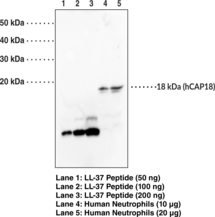Territorial Availability: Available through Bertin Technologies only in France
- Correlated keywords
- antimicrobial autoimmune cathelicidin neutrophils extracellular traps NETs peptides cleaved cleaves humans hCAP18 activated activates M tuberculosis mycobacterium infections infected infects epithelial cells lungs components associated associates associations activation activations activates inflammations NLRP3 inflammasomes disorders systemic lupus erythematosus systemic-lupus-erythematosus SLE autoantibodies autoantibody auto antibody antibodies against proteins predicted predicts predictions diseases immunology western blot WB ELISA cationic
- Product Overview:
LL-37 is a cationic ?-helical peptide expressed in human bone marrow, testis, granulocytes, gingival epithelium, and a variety of immune cells.{41499} It is produced by proteolytic cleavage of the cathelicidin human cationic antimicrobial protein of 18 kDa (hCAP18).{62129} LL-37 has antimicrobial and antiviral activity, and protein levels of LL-37 are increased in epithelial cells, macrophages, and neutrophils following bacterial infection in vitro.{41499,17198,41500,59280} It functions as a chemoattractant for human monocytes, neutrophils, and T cells, and induces chemokine secretion from epithelial cells in infected tissues.{41502,62129} LL-37 is a component of LPS-induced NETs produced from human neutrophils isolated from patients with systemic lupus erythrematosus (SLE) or individuals without SLE.{26640} It also enhances PMA- or S. aureus-induced formation of NETs.{33679} LL-37 can be citrullinated by protein arginine deiminase 2 (PAD2) and PAD4, a modification that reduces its antibacterial and antiviral activities.{35769,59280} Native, but not citrullinated, LL-37 prevents mortality in a mouse model of D-galactosamine-sensitized endotoxic shock.{35769} Cayman’s LL-37 Polyclonal Antibody can be used for Western blot.
Cayman Chemical’s mission is to help make research possible by supplying scientists worldwide with the basic research tools necessary for advancing human and animal health. Our utmost commitment to healthcare researchers is to offer the highest quality products with an affordable pricing policy.
Our scientists are experts in the synthesis, purification, and characterization of biochemicals ranging from small drug-like heterocycles to complex biolipids, fatty acids, and many others. We are also highly skilled in all aspects of assay and antibody development, protein expression, crystallization, and structure determination.
Over the past thirty years, Cayman developed a deep knowledge base in lipid biochemistry, including research involving the arachidonic acid cascade, inositol phosphates, and cannabinoids. This knowledge enabled the production of reagents of exceptional quality for cancer, oxidative injury, epigenetics, neuroscience, inflammation, metabolism, and many additional lines of research.
Our organic and analytical chemists specialize in the rapid development of manufacturing processes and analytical methods to carry out clinical and commercial GMP-API production. Pre-clinical drug discovery efforts are currently underway in the areas of bone restoration and repair, muscular dystrophy, oncology, and inflammation. A separate group of Ph.D.-level scientists are dedicated to offering Hit-to-Lead Discovery and Profiling Services for epigenetic targets. Our knowledgeable chemists can be contracted to perform complete sample analysis for analytes measured by the majority of our assays. We also offer a wide range of analytical services using LC-MS/MS, HPLC, GC, and many other techniques.
Accreditations
ISO/IEC 17025:2005
ISO Guide 34:2009
Cayman is a leader in the field of emerging drugs of abuse, providing high-purity Schedule I-V Controlled Substances to federally-licensed laboratories and qualified academic research institutions for forensic analyses. We are certified by ACLASS Accreditation Services with dual accreditation to ISO/IEC 17025:2005 and ISO Guide 34:2009.





